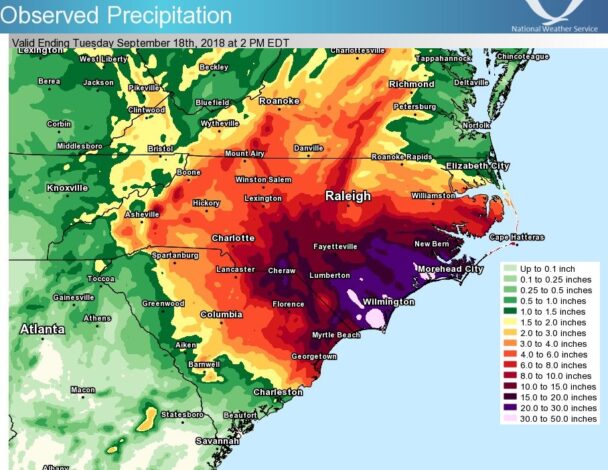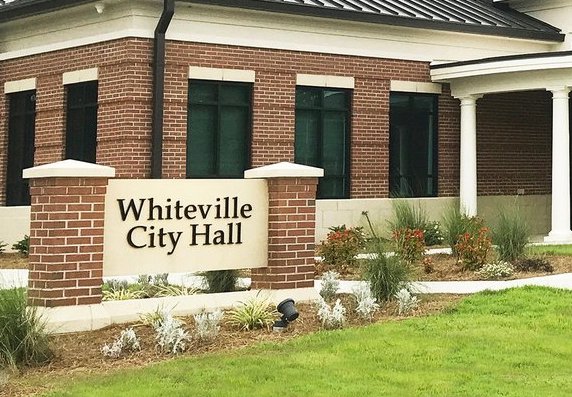As hurricane season winds down, a storm is building over State Auditor Dave Boliek’s exhaustive report on the N.C. Office of Resilience and Recovery (NCORR).
NCORR was established to funnel relief funds to homeowners in the wake of Hurricanes Matthew and Florence. The agency dealt with more than $1 billion in federal funding, yet required a $297 million bailout from the General Assembly last year.
NCORR was set up to take over recovery efforts after Matthew – a fund which was also mismanaged, Boliek said.

“The unfortunate truth of this report is the response from North Carolina to Hurricanes Matthew and Florence was a disaster. When government decides to focus on administrative procedures ahead of boots on the ground, hurricane victims get hurt,” Boliek said in a press release. “North Carolina must implement a long-term, comprehensive plan that can be used for decades to come. As state leaders, we owe it to the people of North Carolina to come to the table, institute accountability, and map out a transparent and permanent strategy to respond to hurricanes.”
NCORR received 11,654 applications for assistance from homeowners, and 3,522 have been completed, the report said. Boliek’s office found that applicants had to go through eight steps to apply, and each of those steps required an average of 100 days to complete – or more than 2.5 years before an application could be approved or rejected. Each application that was approved averaged 936 days for final approval.
On average, applicants were out of their homes for four years, the report said, as opposed to the 18 months called for in NCORR guidelines.
NCORR had no standard budget monitoring, or a structured plan for its budget, Boliek said.
“They operated reactively, making spending decisions based on available funds rather than comprehensive needs or performance targets,” the report said. “Inconsistent reconciliation indicates nearly $785 million in public funds was disbursed to vendors without a single, reconciled source of financial truth or robust oversight.”
In multiple cases, the report said NCORR paid contractors without verifying that work was completed.
The agency also spent $24.5 million on a program designed to track expenditures by application, but the program, called Salesforce, suffered from “incomplete and inconsistent data” which delayed assistance for many families.
Thousands of applicants simply gave up on repairing or rebuilding their homes due to the complicated and confusing process.
ReBuild NC was the arm of NCORR tasked with managing and overseeing contractors, the report said. RebuildNC did not hold some contractors accountable for substandard work. RebuildNC also gave multiple high-cost contracts to one firm, Rescue Construction Solutions, which failed to install most of its modular homes on schedule. Rescue consistently denied any wrongdoing, the report said.
Boliek also criticized the use of an outside company that was hired to manage the Homeowner Recovery Program (HRP).
The firm was paid a flat rate of $480 per month per application until an application was approved or denied. Boliek said contracts were delayed to build income for the contractor, to the point that each home repair or replacement project generated $41,000 in administrative costs. When NCORR was forced to bring the process back into the agency, administrative costs were lowered by 90 percent, to $4,100 per home.
Many of the applications rejected by the outside firm could have been rejected or refiled immediately, Boliek said, saving money and preventing delays for affected homeowners.
Boliek found that by delaying decisions on applications, NCORR left some families in temporary housing – including motels and condominiums – for years. In one case, the state paid $230,000 to house a single family. Different rates were paid for different families in the same motel chains at the same time in some cases, the report said.

Laura Hogshead, director of NCORR, resigned after a second legislative hearing in February when she was sharply questioned by members of the General Assembly. At a previous hearing in November, solons insisted Hogshead immediately resign.
In the November hearing, Hogshead had to be publicly corrected on the amount that NCORR had overspent. She also told legislators that if NCORR was put in charge of Hurricane Helene recovery, fewer mistakes would be made. She insisted NCORR “could be trusted” with future hurricane relief funding.
During the November hearing, Hogshead said NCORR needed more funding, and would learn from previous mistakes.
Hogshead told the hearing that her staff had lost track of how much money was being spent, despite having eight accountants in the office that costs $100,000 each per year. NCORR at that point required more than $150 million to maintain temporary housing and complete projects that were still waiting since 2018.
Pryor Gibson, the deputy legislative counsel for then-Gov. Roy Cooper, corrected Hogshead’s original estimate of how much is needed to handle the deficit. Gibson told the legislative committee that completing the current required tasks might actually require $221 million, not $150 million.
“Will you turn in your resignation today?” Columbus Rep. Brenden Jones asked Hogshead.
“No sir, I will not,” Hogshead responded.
“We simply were not watching carefully enough,” Hogshead said of her agency’s accounting processes.
“That’s an understatement,” replied Jones, co-chair of the house oversight committee. “If you worked for me, I would fire you. You guys are like a teenager with mama’s credit card. … We’ve given you every opportunity, everything you’ve asked for.”
In December 2024, the legislature froze all NCORR activities until a $297 million emergency allocation package could be approved.
Hogshead resigned without warning in February, and Gibson was placed in charge of NCORR by the governor.
The report also notes that NCORR did not follow guidelines for properly accounting for grants and loans from the federal government – which could lead to penalties against the state and less assistance in the next disaster.
Boliek suggested that the state establish a tightly monitored permanent agency for dealing with future disaster funds.
“NCORR initiated its disaster recovery efforts without a dedicated budget plan to guide development, execution, or monitoring,” the report said. “While HUD approved Action Plans were created for each funding stream, NCORR did not convert these high-level plans into
practical, enforceable budgets and schedules for daily management of HRP. As a result, NCORR staff lacked the tools needed to plan and execute the program efficiently, ensure fiscal accountability, or proactively identify signs of overspending.
“…Interviews with NCORR’s CFO and budget director confirmed that budget monitoring was minimal and focused on technical accounting rather than strategic oversight. As one staff member summarized, “If there was no money left, the program was over.”
“They had a pot of money and they spent it,” Boliek said at a press conference Wednesday. “They took the attitude that we’re going to spend it and when we’re out, then the program’s over. They didn’t spend money on a mission-oriented project with measurable incremental goals.”
The full 500 page report can be found here:
https://www.auditor.nc.gov/documents/reports/performance/per-2025-4902/open








